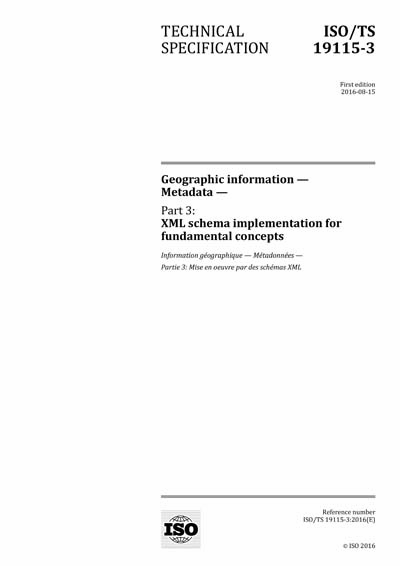Historical
ISO/TS 19115-3:2016
Geographic information - Metadata - Part 3: XML schema implementation for fundamental concepts
ISO/TS 19115-3:2016 defines an integrated XML implementation of ISO 19115‑1, ISO 19115‑2, and concepts from ISO/TS 19139 by defining the following artefacts:
a) a set of XML schema required to validate metadata instance documents conforming to conceptual model elements defined in ISO 19115‑1, ISO 19115‑2, and ISO/TS 19139;
b) a set of ISO/IEC 19757‑3 (Schematron) rules that implement validation constraints in the ISO 19115‑1 and ISO 19115‑2 UML models that are not validated by the XML schema;
c) an Extensible Stylesheet Language Transformation (XSLT) for transforming ISO 19115-1 metadata encoded using the ISO/TS 19139 XML schema and ISO 19115‑2 metadata encoded using the ISO/TS 19139‑2 XML schema into an equivalent document that is valid against the XML schema defined in this document.
ISO/TS 19115-3:2016 describes the procedure used to generate XML schema from ISO geographic information conceptual models related to metadata. The procedure includes creation of an UML model for XML implementation derived from the conceptual UML model.
This implementation model does not alter the semantics of the target conceptual model, but adds abstract classes that remove dependencies between model packages, tagged values and stereotypes required by the UML to XML transformation software, and refactors the packaging of a few elements into XML namespaces. The XML schema has been generated systematically from the UML model for XML implementation according to the rules defined in ISO/TS 19139 or ISO 19118.
International Organization for Standardization [iso]

